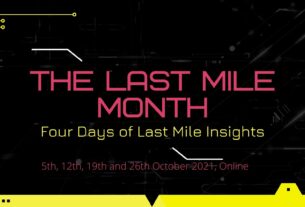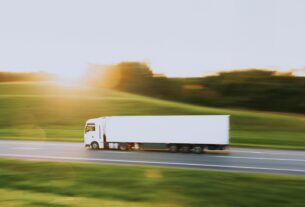Data is everywhere but how many logistics organisations are using it to increase their efficiency? We were honoured to be part of MOVE 2023, one of the largest events for logistics, and speak on the topic together with Zach Burns, International Sustainability Supervisor, UPS, Mark Thomas, EVP Marketing and Alliances, Ridecell, and Phillip Davies, Co-founder, Magway.
More focus on consumers’ journey and supply chain collaboration in our July edition. To get the digital magazine subscribe here. Next edition will feature: EVRi, Descartes Systems Group, The Smart Cube, Anaplan, Board International, and more.
Data can be used to increase the sustainability element in last mile operations. This could be anything from choosing the best route to providing information to the driver on the way they drive, when the vehicle is idling, etc. ‘The approach should be to streamline the data,’ explained Mark Thomas from Ridecell.
For UPS data plays a vital role in decarbonising their last mile fleets and reaching their NetZero goals. Zack Burns from UPS looked at how data is being used in terms of EVs. ‘You cannot expect to plug in an EV the same way you do with a smartphone and see the same results,’ he said. Data in those cases is used to distribute where the energy goals and how vehicles are being prioritised.
Data is used to remove pressures on the grid for example and also increase the ROI. ‘We need to move fast and be more effective,’ Zack continued. All participants agreed it would be vital to make the most out of data sets and employ people that know how to analyse them and take further actions.
Integrating data
Data comes from many different sources and it is vital to make sure that all systems talk to one another. Phillip Davies from Magway looked at how hard this could be and also what the benefits of such proper integrations are. ‘We all need to communicate with one another to make the best out of it,’ Phillip explained.

Join us on the 28th November to talk about:
Customer engagement & Logistics Responsibility
Future Communities & Changing Infrastructure
Better Last Mile Delivery
E-com Excellence
Another important point raised during the discussion was why logistics organisations are not willing to share data. Many are scared they will expose a competitive advantage but according to the panellists it will be helpful for all parties, reduce emissions and create more efficiencies.
Primary data
‘One of the biggest challenges is how much primary data is needed to make an impact,’ outlined Zack.
What will be essential is to standardise the way data is being collected and what is being collected. That would streamline the process and improve the way systems communicate with one another.
Courier companies have another layer of difficulties as they have large networks of self-employed delivery drivers. It is hard to get data from them on many occasions.
Data silos
‘Part of the problem is that so much data exists in silos,’ Mark continued. This can be resolved by implementing systems that can speak to one another and collect relevant information. Some of those can be about how the driver is behaving on the road, whether they turn off the engine at each stop, how many stops there are, etc. All of these might seem like minor changes and points to monitor, but taken together they improve efficiency, save costs and make the business greener and more sustainable.
Phillip reiterated how important it is for data handover to be seamless. This applies to thighs in the last mile but also when information is transferred between middle mile and last mile.



